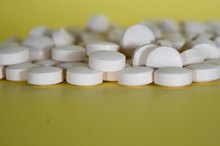Quercetin & Nettles for Allergy Relief
Allergies are the result of an immune system reaction to foreign substances like pollen, dust or medication. The severity of the symptoms vary from person to person and include sneezing, wheezing, runny nose and itchiness. Quercetin and stinging nettles are two over-the-counter natural supplements that may provide allergy relief, but supplementation with these products should be medically supervised.
If you are experiencing serious medical symptoms, seek emergency treatment immediately.
Quercetin
Quercetin is a nutrient called a bioflavonoid that occurs naturally in some vegetables and fruits, giving them their color. It is believed to have antioxidant properties, and research done in test tubes found quercetin helpful for preventing immune cells from releasing histamines, the chemicals responsible for allergic reactions, notes the University of Maryland Medical Center 12. Naturalnurse.com reviewed several research studies that found quercetin effective in managing symptoms of allergies when used either alone or in combination with vitamin C.
Nettles
Quercetin Dihydrate Side Effects
Learn More
Stinging nettles, scientifically known as Urtica doica, is a medicinal herb native to the U.S. and Europe. Nettles have been used in folk medicine to prevent seasonal allergies, either in a juice form or prepared homeopathically. According to Naturalnurse.com, research studies have found nettle to be beneficial for allergic patients.
Dosage
Quercetin is considered a safe and well tolerated supplement for adults, but it is not recommend for children. A daily dose of 250 to 600 milligrams of quercetin is usually prescribed by a health care provider. Typical dosage of nettles is 600 mg of dried herb or 2 to 4 milliliter per day of fluid extract in divided doses. These dosage may be adjusted based on the severity of your symptoms and other medical conditions you might have associated with allergies.
- Quercetin is considered a safe and well tolerated supplement for adults, but it is not recommend for children.
- A daily dose of 250 to 600 milligrams of quercetin is usually prescribed by a health care provider.
Side Effects and Drug Interactions
Holy Basil & Blood Pressure
Learn More
Quercetin is generally considered a safe drug. Side effects may include an upset stomach and headaches. Higher dosages may result in kidney problems. Quercetin may interact with anticoagulants and chemotherapy drugs and corticosteroids, warns University of Maryland Medical Center 12.
Nettle supplements are generally safe and well tolerated when used as recommended by a health care provider. Possible side effects include mild stomach and fluid retention. Nettle may interact with blood-thinning drugs and conventional medication used for high blood pressure and diabetes.
- Quercetin is generally considered a safe drug.
- Higher dosages may result in kidney problems.
Considerations
Consult a qualified health care provider to find out optimal dosage of quercetin and nettles for your condition. Keep in mind that these supplements do not replace conventional antiallergy drugs and are not approved by U.S. Food and Drug Administration to treat allergies.
Related Articles
References
- University of Maryland Medical Center: Quercetin
- University of Maryland Medical Center: Stinging Nettle
- Memorial Sloan Kettering Cancer Center. Quercetin. Updated December 6, 2016.
- Mlcek J, Jurikova T, Skrovankova S, Sochor J. Quercetin and its anti-allergic immune response. Molecules. 2016;21(5):623. doi:10.3390/molecules21050623
- Serban MC, Sahebkar A, Zanchetti A, et al. Effects of quercetin on blood pressure: a systematic review and meta-analysis of randomized controlled trials. J Am Heart Assoc. 2016;5(7). doi:10.1161/JAHA.115.002713
- Kressler J, Millard-stafford M, Warren GL. Quercetin and endurance exercise capacity: a systematic review and meta-analysis. Med Sci Sports Exerc. 2011;43(12):2396-404. doi:10.1249/MSS.0b013e31822495a7
- Askari G, Ghiasvand R, Paknahad Z, et al. The effects of quercetin supplementation on body composition, exercise performance and muscle damage indices in athletes. Int J Prev Med. 2013;4(1):21-6.
- Lam TK, Rotunno M, Lubin JH, et al. Dietary quercetin, quercetin-gene interaction, metabolic gene expression in lung tissue and lung cancer risk. Carcinogenesis. 2010;31(4):634-42. doi:10.1093/carcin/bgp334
- Penn State Hershey Milton S. Hershey Medical Center. Quercetin. Updated October 19, 2015.
- Jin F, Nieman DC, Shanely RA, Knab AM, Austin MD, Sha W. The variable plasma quercetin response to 12-week quercetin supplementation in humans. Eur J Clin Nutr. 2010;64(7):692-7. doi:10.1038/ejcn.2010.91
- Zhang M, Swarts SG, Yin L, et al. Antioxidant properties of quercetin. Adv Exp Med Biol. 2011;701:283-9. doi:10.1007/978-1-4419-7756-4_38
Writer Bio
Brindusa Vanta is an alternative health care doctor who has been writing since 2006. She has written for the Oakville Massage Community and Information Network, and she focuses on nutrition and homeopathy. She received her medical degree from Iuliu Hatieganu University of Medicine, Romania, and her homeopathic diploma from Ontario College of Homeopathic Medicine.









